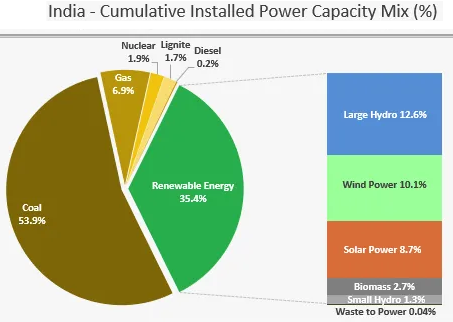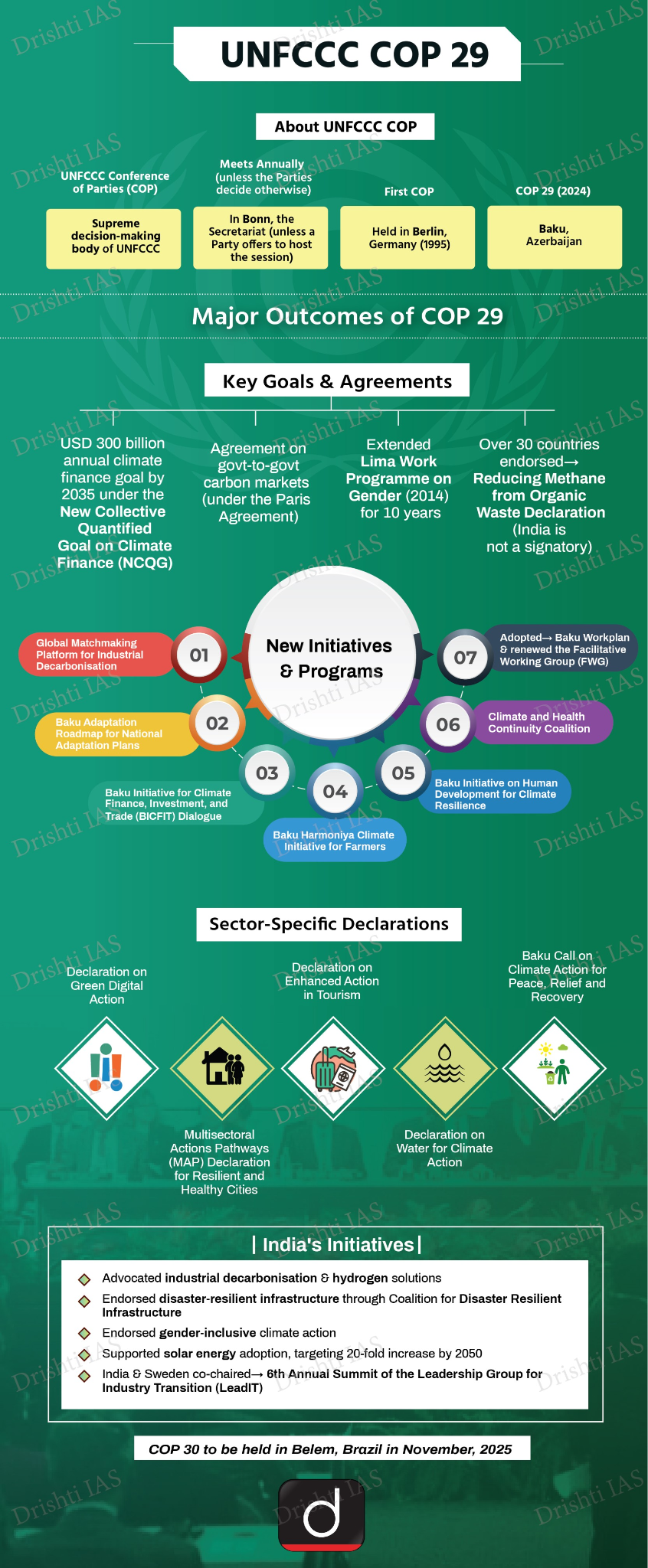Karnataka HC Strikes Down Electricity Rules, 2022 | 09 Jan 2025
For Prelims: Electricity (Promoting Renewable Energy Through Green Energy Open Access) Rules, 2022 (GEOA Rules, 2022), Electricity Regulatory Commission, Renewable Energy Programmes, Green Energy, Waste-to-Energy Plants, Discoms, Renewable Purchase Obligation (RPO), Green Hydrogen, Green Ammonia, Electricity Act, 2003, Glasgow Summit 2021, Union List, Concurrent List.
For Mains: Promotions of open access green energy and issues arising out of it.
Why in News?
Recently, in the Brindavan Hydropower Private Limited Case, 2024, the Karnataka High Court struck down the Electricity (Promoting Renewable Energy Through Green Energy Open Access) Rules, 2022 (GEOA Rules, 2022), formulated by the Central Government.
- The Court also struck down the Karnataka Regulatory Commission (Terms and Conditions for Green Energy Open Access) Regulations, 2022, which were framed by Karnataka Electricity Regulatory Commission (KERC) based on the now-invalidated GEOA Rules, 2022.
What are the Key Facts of the Case?
- Petitioners' Arguments: Hydroelectric companies challenged the GEOA Rules, 2022, asserting that the rule infringed on KERC’s exclusive powers to frame rule under Sections 42(2) and 181 of the Electricity Act, 2003.
- Centre's Defence: The Central Government defended the rules, citing its powers under Entry 14 of the Union List, Entry 38 of the Concurrent List, and Section 176(1) of the Electricity Act, 2003.
- It claimed the rules were essential to meet international treaty obligations under COP26 Commitments at the Glasgow Summit 2021.
- Reason for Striking Down: The Court ruled that the Central Government lacked authority under the Electricity Act, 2003, to frame such rules, as these powers are delegated to State Electricity Regulatory Commissions like KERC.
- The Court stated that the centre cannot use Section 176(2) as a residual power to override the regulatory framework.
- Electricity Act, 2003 ensures that regulatory powers, including tariff determination and open access provisions, are exercised by independent regulatory commissions, free from governmental interference.
Note:
- Electricity Policy, 2005 places the responsibility for facilitating open access squarely on State Regulatory Commissions.
- Electricity Act, 2003:
- Section 42(2): It assigned the Appropriate Commission exclusive authority over open access to distribution of licensees.
- Section 181: State Commissions may issue regulations consistent with the Electricity Act, 2003 and its rules to implement its provisions.
- Section 176(1): The Central Government may make rules for carrying out the provisions of this Act, 2003.
- Section 176(2): It provided for framing Rules for the specific purposes enumerated therein. E.g., functions and duties of the Central Electricity Authority.
- Entry 14 of the Union List: It deals with entering into treaties and agreements with foreign countries and implementing treaties, agreements and conventions with foreign countries.
- Entry 38 of the Concurrent List: Electricity is a concurrent subject at Entry 38 in List III of the seventh Schedule of the Constitution of India.
- The Ministry of Power is primarily responsible for the development of electrical energy in the country.
What are GEOA Rules, 2022?
- About: It was notified to accelerate India’s ambitious renewable energy programmes, with the objective of ensuring access to affordable, reliable, sustainable and green energy for all through open access.
- Open Access means a consumer can buy electricity from a person, other than distribution licensee of his area of supply.
- Salient Features:
- Green Energy: It promotes the generation, purchase, and consumption of green energy, including energy from Waste-to-Energy plants.
- Lower Threshold: The Open Access Transactions limit was reduced from 1 MW to 100 kW, allowing small consumers to buy renewable energy.
- Right to Demand Green Power: Consumers are entitled to ask for green power from Discoms, which must supply it.
- Uniform RPO: A uniform Renewable Purchase Obligation (RPO) applies to all obligated entities, including Green Hydrogen and Green Ammonia.
- RPO mandates obligated entities, such as discoms, to purchase a certain percentage of their electricity from renewable energy (RE) sources.
- Green Certificates: Consumers using green energy receive green certificates as recognition.
- Incentives like caps on cross-subsidy and removal of extra surcharges promote green energy.
What is the Status of India’s Power Sector?
- India, the third-largest electricity producer and consumer (442.85 GW as of April 2024), saw power consumption grow by 9.5% in FY23.

- Energy projects form 24% of the Rs. 111 lakh crore infrastructure pipeline.
- The aggregate technical & commercial (AT&C) losses stands at 15.4% in the fiscal year 2023.
- Under the Revamped Distribution Sector Scheme (RDSS), India aims to reduce the AT&C losses at pan-India levels to 12-15% by 2024-25.
- Committee Related to Reform in Power Sector:
- Kirit Parikh Committee (2022): Recommended pricing reforms for petroleum and natural gas linked to power generation.
- Ashok Chawla Committee (2011): Studied resource allocation, including coal and natural gas for power generation.
- Deepak Parekh Committee (2008): Recommended measures for financing power sector projects.
India’s Updated NDC Target
- At the COP26 Glasgow Summit, 2021, India pledged to cut emissions to net zero by 2070, outlining a five-pronged "Panchamitra" climate action plan.
- Achieve 500 GW of non-fossil energy capacity by 2030.
- Source 50% of energy requirements from renewable sources by 2030.
- Reduce projected carbon emissions by 1 billion tonnes by 2030.
- Lower carbon intensity of the economy by 45% by 2030 compared to 2005 levels.
- Reach net-zero emissions by 2070.
Conclusion
The Karnataka High Court's ruling underscores the need for adherence to the Electricity Act, 2003, ensuring that the power to regulate open access remains with State Electricity Regulatory Commissions. The judgment highlights the balance between central policies and state autonomy, pivotal for India's energy sector governance.
|
Drishti Mains Question: Evaluate India's commitments under the COP26 summit and their impact on national energy policies. |
UPSC Civil Services Examination, Previous Year Question (PYQ)
Prelims
Q. In India, which of the following review the independent regulators in sectors like telecommunications, insurance, electricity, etc.?(2019)
- Ad Hoc Committees set up by the Parliament
- Parliamentary Department Related Standing Committees
- Finance Commission
- Financial Sector Legislative Reforms Commission
- NITI Aayog
Select the correct answer using the code given below:
(a) 1 and 2
(b) 1, 3 and 4
(c) 3, 4 and 5
(d) 2 and 5
Ans: (a)
Q. With reference to the Indian Renewable Energy Development Agency Limited (IREDA), which of the following statements is/are correct? (2015)
- It is a Public Limited Government Company.
- It is a Non-Banking Financial Company.
Select the correct answer using the code given below:
(a) 1 only
(b) 2 only
(c) Both 1 and 2
(d) Neither 1 nor 2
Ans: (c)
Mains
Q. “Access to affordable, reliable, sustainable and modern energy is the sine qua non to achieve Sustainable Development Goals (SDGs)”.Comment on the progress made in India in this regard. (2018)
Q. What do you understand about the Run-of-river hydroelectricity project? How isit different from any other hydroelectricity project? (2013)

